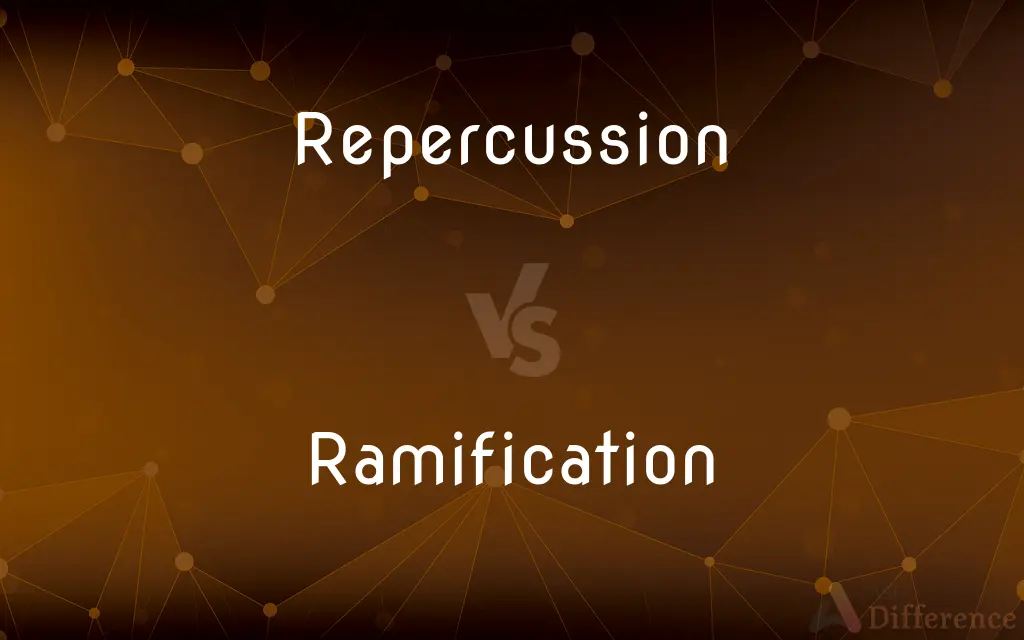Repercussion vs. Ramification — What's the Difference?
By Tayyaba Rehman & Fiza Rafique — Updated on March 7, 2024
Repercussions are immediate, often unforeseen effects, while ramifications are complex, branching consequences.

Difference Between Repercussion and Ramification
Table of Contents
ADVERTISEMENT
Key Differences
Repercussions refer to the direct and often immediate outcomes or effects that follow an event or action, typically suggesting a negative or undesirable impact. They can be seen as the initial shockwaves or responses to a specific action, emphasizing the short-term consequences that are felt more immediately. Ramifications, on the other hand, denote the broader, more complex consequences that stem from an action or decision, often unfolding over time. These are the branching effects that extend into various aspects, highlighting the complexity and often unforeseen long-term consequences of an initial event.
While repercussions might be felt and identified shortly after an event, making them somewhat predictable or expected, ramifications tend to develop gradually, revealing the full extent of consequences only over time. This can make ramifications more challenging to predict and manage, as they involve multiple outcomes spreading across different areas. For example, the repercussions of a natural disaster might include immediate damage to infrastructure, whereas the ramifications could involve long-term economic and social challenges for the affected community.
Repercussions often serve as a warning or immediate feedback to an action, potentially allowing for quick responses or adjustments. In contrast, the branching nature of ramifications requires more comprehensive analysis and strategic planning to address, due to their widespread impact and the interconnection of various outcomes. The complexity of ramifications necessitates a broader perspective to fully understand and mitigate the long-term effects of an initial action or decision.
In dealing with repercussions, individuals or organizations might focus on immediate damage control and short-term solutions. However, addressing ramifications involves a more strategic approach, considering the broader implications and developing plans that account for the interconnected consequences that may unfold over time. Understanding the distinction between these two terms is crucial for effective problem-solving and decision-making, emphasizing the need to consider both the immediate and the extended impacts of actions.
Comparison Chart
Nature
Immediate, direct effects
Complex, branching consequences
ADVERTISEMENT
Predictability
Often more predictable
Less predictable, unfolds over time
Scope
Short-term, specific
Long-term, widespread
Response
Requires quick, immediate action
Demands strategic, long-term planning
Example
Immediate disruption after an event
Long-term economic and social effects
Compare with Definitions
Repercussion
Immediate effect of an action.
The policy change had immediate financial repercussions.
Ramification
Complex consequence of an action.
The new law had wide-ranging ramifications for the industry.
Repercussion
Direct and predictable.
The repercussions of the storm were felt across the city.
Ramification
Involves multiple outcomes.
The event's ramifications affected various aspects of society.
Repercussion
Requires immediate response.
The company acted swiftly to mitigate the repercussions.
Ramification
Requires strategic planning.
Addressing the ramifications demanded a comprehensive approach.
Repercussion
Often negative or undesirable.
The team faced serious repercussions for breaking the rules.
Ramification
Interconnected effects.
The economic ramifications were intertwined with social changes.
Repercussion
Focuses on short-term impacts.
The repercussions of the decision were quickly apparent.
Ramification
Develops over time.
The full ramifications of the policy shift became clear years later.
Repercussion
An often indirect effect, influence, or result that is produced by an event or action.
Ramification
A development or consequence growing out of and sometimes complicating a problem, plan, or statement
The ramifications of a court decision.
Repercussion
A recoil, rebounding, or reciprocal motion after impact.
Ramification
The act or process of branching out or dividing into branches.
Repercussion
A reflection, especially of sound.
Ramification
A subordinate part extending from a main body; a branch.
Repercussion
A consequence or ensuing result of some action.
You realize this little stunt of yours is going to have some pretty serious repercussions.
Ramification
An arrangement of branches or branching parts.
Repercussion
The act of driving back, or the state of being driven back; reflection; reverberation.
The repercussion of sound
Ramification
An offshoot of a decision, fact etc.; a consequence or implication, especially one which complicates a situation.
Repercussion
(music) Rapid reiteration of the same sound.
Ramification
(mathematics) An arrangement of branches.
Repercussion
(medicine) The subsidence of a tumour or eruption by the action of a repellent.
Ramification
The process of branching, or the development of branches or offshoots from a stem; also, the mode of their arrangement.
Repercussion
(obstetrics) In a vaginal examination, the act of imparting through the uterine wall with the finger a shock to the foetus, so that it bounds upward, and falls back again against the examining finger.
Ramification
A small branch or offshoot proceeding from a main stock or channel; as, the ramifications of an artery, vein, or nerve.
Repercussion
The act of driving back, or the state of being driven back; reflection; reverberation; as, the repercussion of sound.
Ever echoing back in endless repercussion.
Ramification
A division into principal and subordinate classes, heads, or departments; also, one of the subordinate parts; as, the ramifications of a subject or scheme.
Repercussion
Rapid reiteration of the same sound.
Ramification
The production of branchlike figures.
Repercussion
The subsidence of a tumor or eruption by the action of a repellent.
Ramification
The act of branching out or dividing into branches
Repercussion
In a vaginal examination, the act of imparting through the uterine wall with the finger a shock to the fetus, so that it bounds upward, and falls back again against the examining finger.
Ramification
A part of a forked or branching shape;
He broke off one of the branches
They took the south fork
Repercussion
A remote or indirect consequence of some action;
His declaration had unforeseen repercussions
Reverberations of the market crash were felt years later
Ramification
A development that complicates a situation;
The court's decision had many unforeseen ramifications
Repercussion
A movement back from an impact
Ramification
An arrangement of branching parts
Common Curiosities
Can an action have both repercussions and ramifications?
Yes, an action can have both immediate repercussions and longer-term ramifications, affecting various aspects differently over time.
How can one manage the repercussions of an action?
Managing repercussions typically involves quick, responsive measures to mitigate immediate negative effects and stabilize the situation.
How do ramifications differ from repercussions?
Ramifications are more complex and branching consequences of an action, often developing over time and involving multiple interconnected outcomes, unlike the more immediate and direct nature of repercussions.
Do all actions have repercussions and ramifications?
Most significant actions will have repercussions and ramifications to varying degrees, depending on the nature of the action and the context in which it occurs.
How can one predict the ramifications of their decisions?
Predicting ramifications involves considering the potential long-term impacts, analyzing past outcomes in similar situations, and consulting expertise to understand the possible branching effects.
Are ramifications always negative?
While ramifications can often be challenging, they are not always negative and can include positive or mixed outcomes depending on the context and responses to the initial action.
What are repercussions?
Repercussions are the immediate, often negative effects or outcomes that directly follow an action or event.
How important is it to communicate potential repercussions and ramifications?
Communicating potential repercussions and ramifications is vital for transparency, informed consent, and effective collaboration in decision-making processes.
What approach is needed to address ramifications?
Addressing ramifications requires strategic, long-term planning to navigate the complex and interconnected outcomes that unfold over time.
How do external factors influence repercussions and ramifications?
External factors such as environmental conditions, societal dynamics, and economic contexts can significantly influence the nature and extent of both repercussions and ramifications.
How do repercussions and ramifications relate to cause and effect?
Repercussions and ramifications are part of the cause-and-effect continuum, with repercussions representing more immediate effects and ramifications denoting the broader, long-term outcomes.
How can one mitigate negative ramifications?
Mitigating negative ramifications involves strategic planning, proactive measures, and sometimes corrective actions to address the root causes and interconnected consequences.
How do repercussions and ramifications affect decision-making?
Understanding potential repercussions and ramifications is crucial for informed decision-making, as it allows individuals and organizations to anticipate and prepare for both immediate and long-term effects.
Can the ramifications of an action be entirely positive?
Yes, the ramifications of an action can be positive, especially if the action was well-planned and executed with positive outcomes in mind, though they may still involve complex and interconnected effects.
Can repercussions evolve into ramifications?
Initial repercussions can evolve into broader ramifications as the immediate effects lead to more complex and widespread consequences over time.
Share Your Discovery

Previous Comparison
Meaning vs. Value
Next Comparison
Average vs. NormalAuthor Spotlight
Written by
Tayyaba RehmanTayyaba Rehman is a distinguished writer, currently serving as a primary contributor to askdifference.com. As a researcher in semantics and etymology, Tayyaba's passion for the complexity of languages and their distinctions has found a perfect home on the platform. Tayyaba delves into the intricacies of language, distinguishing between commonly confused words and phrases, thereby providing clarity for readers worldwide.
Co-written by
Fiza RafiqueFiza Rafique is a skilled content writer at AskDifference.com, where she meticulously refines and enhances written pieces. Drawing from her vast editorial expertise, Fiza ensures clarity, accuracy, and precision in every article. Passionate about language, she continually seeks to elevate the quality of content for readers worldwide.
















































